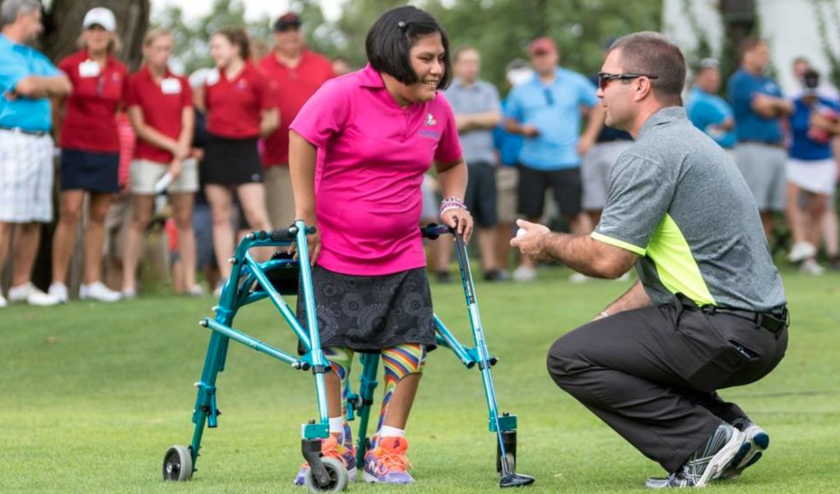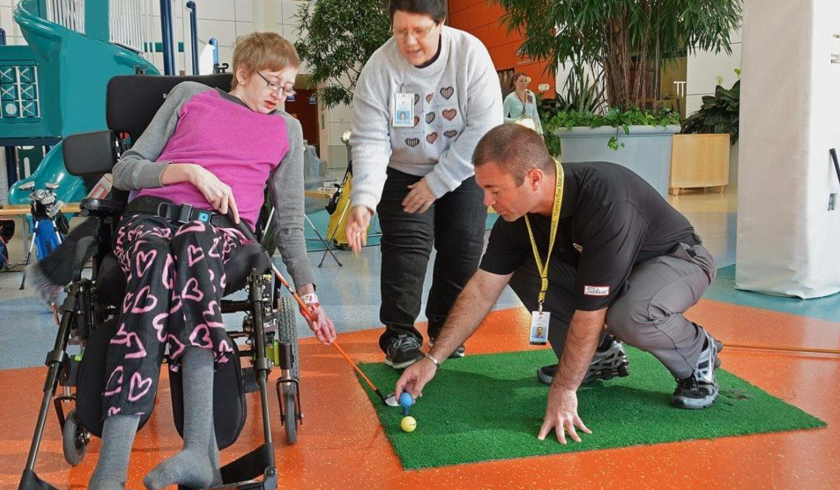If you read headlines or hear news reports, you know there is plenty of darkness in the world these days, stories marked by hatred, brutality and despair.
Yet, in the midst of it all, light still shines. Inspiring stories still exist, about caring people who do remarkable things — people like Kevin Corn.
Corn is 47-years-old and has a 13-year-old son. He is a golf pro by trade, earned membership into the PGA of America while completing a degree in marketing at Coastal Carolina University. He passed the PGA test when he was a freshman in college. When his father first handed him a golf club at the age of 5, Corn knew he wanted a career in golf.

Point being, none of the studies he pursued, none of the training he embraced covered healing, developmental psychology or rehabilitation. Nothing on the resume prepared him for miracle working.
He created that light and made that leap on his own, does it each Wednesday. He makes the 30-minute drive from his home to Ranken Jordan Pediatric Bridge Hospital in Maryland Heights, Missouri, gathers some kids with complex medical conditions, illnesses and injuries and puts a golf club in their hands. He gives them a way to overcome their challenging situation and just be kids again. And it works miracles.
“It’s my favorite day of the week, no question,” Corn says. "They do far more for me than I ever do for them."
Other days of the week, Corn is the head professional at Innsbrook Resort in Innsbrook, Missouri. Anyone who knows a golf pro knows he doesn’t own a lot of free time. But in 2010, he saw an article in PGA Magazine about a program for special-needs kids at a care facility in the Dallas area. It made him think.
"We have the best pediatric-care hospitals in the world right here in St. Louis," Corn explains. "Why isn’t there something like that here?"
He didn’t just think, he acted. A meeting was arranged at Ranken Jordan, a meeting that quickly transitioned from a pitch to a plan. Corn found invaluable support for the plan from U.S. Kids Golf and PGA Reach, which helped him secure the ways and means to bring the plan to life.
So it did, and one Wednesday afternoon in 2011, Corn showed up at Ranken Jordan, unsure of what he was doing or where it was going. The apprehension didn’t last long. He put a golf club in the hands of a complex-care child, watched the sponge golf ball get airborne and saw the reaction. There isn’t words.
“You need one smile, and that’s it,” Corn says. “I wasn’t sure, going in, what the difficulty might be, because it’s challenging to see children who are sick. I think it’s the humane side of any person who would say it’s just tough to see these children and what they're dealing with.
“But once you get that first smile and you realize that’s what you’re doing, helping these kids, you’re hooked.”
A hook is perfectly OK, as is a slice, a chunk, a flop or a flier. One off the window, off the wall, off the instructor’s head ... doesn’t matter. They play it where it lies, in a room, in a hallway, or outside on a recreational field with a putting green — otherwise known as “Ranken Jordan National Golf Links.”
Doesn’t matter.
These are kids with life-threatening injuries from horrific accidents, or born with serious health issues. What matters is they are kids acting like kids, taking divots, talking trash and forgetting for a moment what they’re facing. What matters is the laughter and the smiles.
Ranken Jordan and Corn’s program are a perfect fit. NR chief medical officer Nick Holekamp once told Corn, “It’s the job of the big hospitals to save the kids’ lives; it's the job of facilities like Ranken Jordan to give them their lives back.”
The facility doesn’t just want its population to get well enough to go home, “They want them to go home and be kids,” Corn adds, “to get to do what kids do, as much as they can.”
The walls at Ranken Jordan are brightly colored and decorated. The kids don’t wear bland hospital garb, but dress in their own clothes. They spend 70% of their time outside their rooms, playing video games, shooting baskets, painting, dancing, interacting … and hitting golf balls.

The RJ “bridge” helps them get beyond what makes them different and helps them discover what makes them the same.
“It’s amazing to me,” Corn says. “There’s been numerous kids that come through that the medical staff says, '10-15 years ago, they wouldn’t have survived.' And here they are, not only surviving but really starting to thrive. They are learning these difficult activities that they still can do, despite the challenges they’re facing.”
The average patient stay at RJ is 42 days and two-thirds of the patients require some type of breathing assistance. That includes kids who spend years at the facility and kids who spend only a week. When Corn started the golf program, RJ had 34 beds and his group included only two or three kids. Since, the facility has expanded to 60 beds and the participants number fluctuates between seven and eight.
“All of these kids have been told they ‘can’t do something,” Corn says. “That’s not really an option at Ranken Jordan, certainly not in our program. If they want to be there, they’re going to hit golf balls.”
They have included children walking for the first time, children with ventilators or feeding tubes, children standing to swing despite having both legs amputated, children with acute stress disorder, talking for the first time after not doing so for months. These things occur regularly on Wondrous Wednesday.
“I think of ‘Anna,’ who for the longest time was coming to golf laying face down on a gurney,” Corn said. “And normally you think, ‘Well, a kid laying face down on a gurney can’t hit a golf ball, right? Well, she’ll hit them for an hour at a time and only stops because she has to go to therapy.
“But we also showed her how with the “almost” golf balls we use - which are lighter weight than regular golf balls - that she can actually roll them up on the tee. And so she’ll tee the golf balls up on her own and hit them - with an IV in her arm, laying on a gurney. She does that stuff and thinks nothing of it.
“It’s just amazing. I see those types of things weekly and I’m amazed every time I go that it’s happening.”
RELATED: 'The ModGolf Podcast:' The healing power of golf for kids who can use a boost
Full disclosure, Corn also has his heart broken. Kids recovering from catastrophic injuries or complex medical challenges don’t always recover, despite the care they receive. “No child should be dealing with healthcare issues,” Corn said. “But unfortunately they do and we’ve lost six or seven while I’ve been there. That’s the complexities of what they’re dealing with. It’s hard; you never get used to that.”
At the same time, kids have recovered, gone home and - encouraged by Corn’s program — continued to hit golf balls. “I got a text a few years ago from some parents,” Corn says. “And their child had picked up a club for the first time while laying down in bed at Ranken Jordan.
“Well, he went home and continued to play and he ended up playing for his high school golf team his senior season.”
Each story tops the next. Corn has been spending Wednesdays at Ranken Jordan for 12 years now and the miracles are piled high. He insists on crediting the aforementioned foundations and the hospital staff for his program. In 2019, a local TV station (KMOV) and Scott Credit Union donated a full-swing simulator to the cause, an exciting addition.
But there is a frustration factor. Corn and others believe every facility like Ranken Jordan should have a head golf pro, i.e. a similar program. He would love to see the mission expand to other facilities, both locally and nationally. The costs involved are not prohibitive, but the manpower requirements are difficult to fill.
“To me, there’s no reason not to expand it,” he says. “It’s just a question of finding an organization to get behind it and make a difference in the lives of a lot of kids.”
Those who want to support Corn’s efforts can do so by donating at RankenJordan.org or PGAReach.org. Those with golf-teaching skills, and the time to donate, can simply speak up.
In the meantime, Corn will continue looking forward to Wednesdays at Ranken Jordan, watching more miracles take place.










